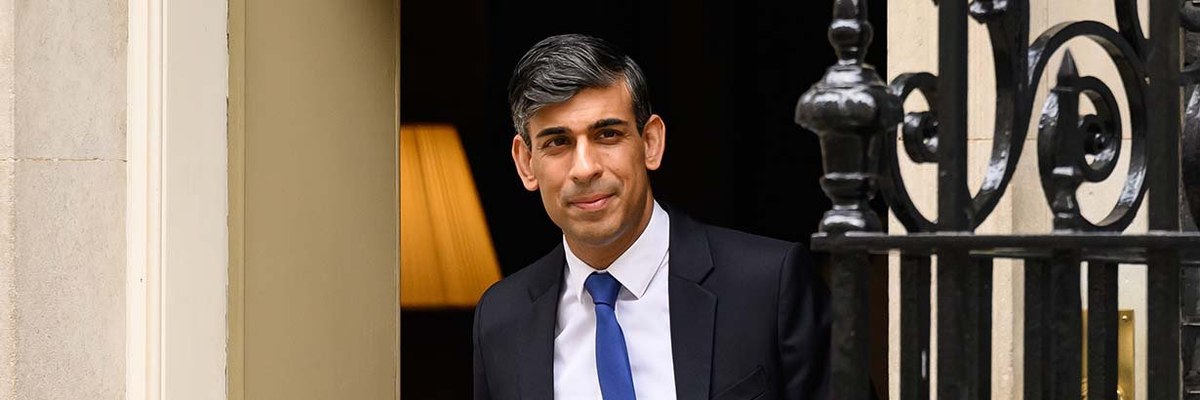Keir Starmer continues to be the UK’s most popular politician, and for the first time we look at national attitudes to Vaughan Gething, Susan Hall and Humza Yousaf
Keir Starmer and Labour
Keir Starmer continues to be the most popular (least unpopular) political figure in the UK. Currently 35% of Britons have a favourable view of Starmer (+3 from late February), but 53% of people have a negative view of the Labour leader (no change), giving a net favourability rating of -18 overall.
Starmer’s ratings are similar to those of his party, which 38% of Britons have a favourable opinion of (-1) compared to 53% who have an unfavourable view (+3).
Rishi Sunak and the Conservatives
After a bruising week of leadership speculation, Rishi Sunak’s favourability ratings continue to languish. With only 21% having a positive opinion of the prime minister (-1 from the previous poll), and 71% having an unfavourable view (+2), Sunak’s net score of -50 is close to his lowest to date (-51 in January).
The Conservative party is similarly unpopular, with 20% having a favourable opinion (no change) but 72% having an unfavourable opinion (-2).
Nigel Farage
This is our first poll to include Nigel Farage since he emerged from the I’m a Celebrity jungle in December, and the results show that if his appearance had any impact on public perceptions of him, they have since disappeared. The 24% who have a favourable view of the Reform UK president is virtually the same as it was in December (-1), while the 64% who have an unfavourable view is unchanged.
Notably, those who voted for the Conservatives in 2019 have a more favourable opinion of Nigel Farage than they do of Rishi Sunak. While Farage is popular among 2019 Tories – 50% have a positive opinion and 42% a negative one – Sunak is unpopular, with 40% having a favourable view of the PM but 54% an unfavourable one.
Vaughan Gething and Mark Drakeford
This week saw Vaughan Gething become First Minister in Wales, following his election to leader of Welsh Labour. Unsurprisingly for a Welsh politician, Gething is poorly known on the UK level, with fully 75% of Britons saying they don’t know how they feel about him. Currently 8% have a positive view and 17% a negative one.
His predecessor Mark Drakeford is hardly well-known himself, with 56% of Britons saying they don’t have an opinion on him after more than five years in office. One in six (16%) say they have a positive view of Drakeford, compared to 28% who have a negative view.
Diane Abbott
Diane Abbott was inadvertently at the centre of a Conservative party row this month, after news emerged that Tory donor Frank Hester made remarks about her that many considered to be racist.
One in five Britons (19%) have a favourable view of Diane Abbott, compared to 55% who have an unfavourable one. Among those who voted for Labour in 2019, when she was in shadow cabinet, 43% have a positive opinion and 32% a negative one, but among those currently intending to back the party she is divisive at 38% to 36%.
Abbott has been under suspension from the Labour party since April 2023, following the backlash against a letter she penned on racism. In recent days, senior Labour politician Harriet Harman has said it would be sad if Abbott’s career were to end outside the Labour party, and Labour voters agree. Despite being divided on her personally, those who currently intend to vote Labour say that Abbott should be readmitted to the party by 48% to 18%. The wider public are divided – 31% say Abbott should be allowed to return, but 32% say she should not.
Sadiq Khan and Susan Hall
Sadiq Khan was another cause of a Conservative party row in recent weeks, with Lee Anderson suspended as Tory deputy chair for having said the mayor was being controlled by Islamists.
Our first survey on national attitudes towards the Mayor of London since mid-2022 shows Khan’s popularity has declined slightly: 24% have a favourable view of Khan (-3), while 56% have an unfavourable opinion (+5).
Our first ever survey of national attitudes towards Khan’s Conservative rival, Susan Hall, shows that she is poorly recognised in the wider country. Almost eight in ten Britons (79%) say they don’t know about Susan Hall, while 5% have a positive opinion and 16 a negative one.
Even among those few 2019 Conservative voters who have heard of Hall, they are more likely to have a negative opinion of her (12%) rather than a positive one (6%).
Humza Yousaf and Nicola Sturgeon
This is also the first time we’ve asked about the national favourability of Scottish First Minister Humza Yousaf. While a majority of Britons do have a view on Yousaf, such opinion tends to be negative – 39% have a negative view compared to 15% a positive one.
Polling on attitudes to predecessor Nicola Sturgeon, the first since February 2023, shows that attitudes towards her have grown substantially more negative over the last year, a period of time that includes her arrest as part of police investigation into the SNP’s finances. More than six in ten Britons (63%) have an unfavourable opinion of Sturgeon (+12 since the prior poll) compared to only 19% with a positive view (-14).
Boris Johnson, Liz Truss and Jeremy Corbyn
This month’s poll also included several former party leaders.
Our first poll asking about Boris Johnson since June 2023 shows largely the same opinion towards him, with 24% having a positive view (+4) and 70% having a negative opinion (-2). This makes him about as unpopular as Rishi Sunak on a national level, although he is less popular among those currently intending to vote for the party, of whom 64% have a positive view of Johnson compared to 76% for Sunak.
Among those who voted for Boris Johnson to be prime minister in 2019, however, the former PM is more well-liked than the current one, at 50% compared to Sunak’s 40%.
Popular among neither group of Tory voters – or anyone else – is Liz Truss. This poll is the first time we’ve asked about the former PM since February 2023, and opinion towards her remains rock bottom: only 8% have a favourable view of her (unchanged since the last poll) while 81% have an unfavourable view (also unchanged).
This is actually the first time we have asked the public’s opinion of Jeremy Corbyn since April 2020, and intervening four years it has changed little. Around a quarter (24%) have a favourable view of Corbyn (+4), while 65% have an unfavourable view (no change).
While Corbyn is popular among those who backed the party he led into the 2019 general election (55% favourable to 39% unfavourable), he is divisive among current Labour voters, with 47% liking him but 46% disliking him. His successor Keir Starmer is more popular among both groups.
Photo: Getty















